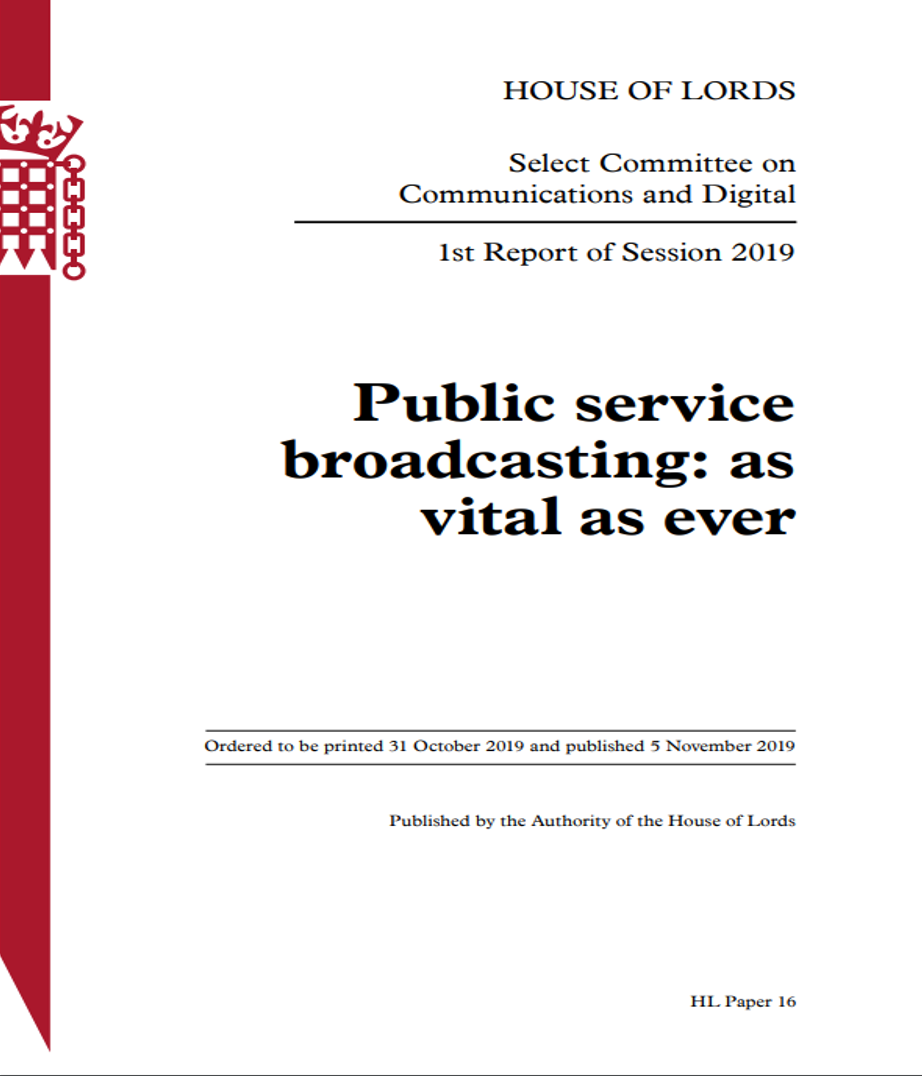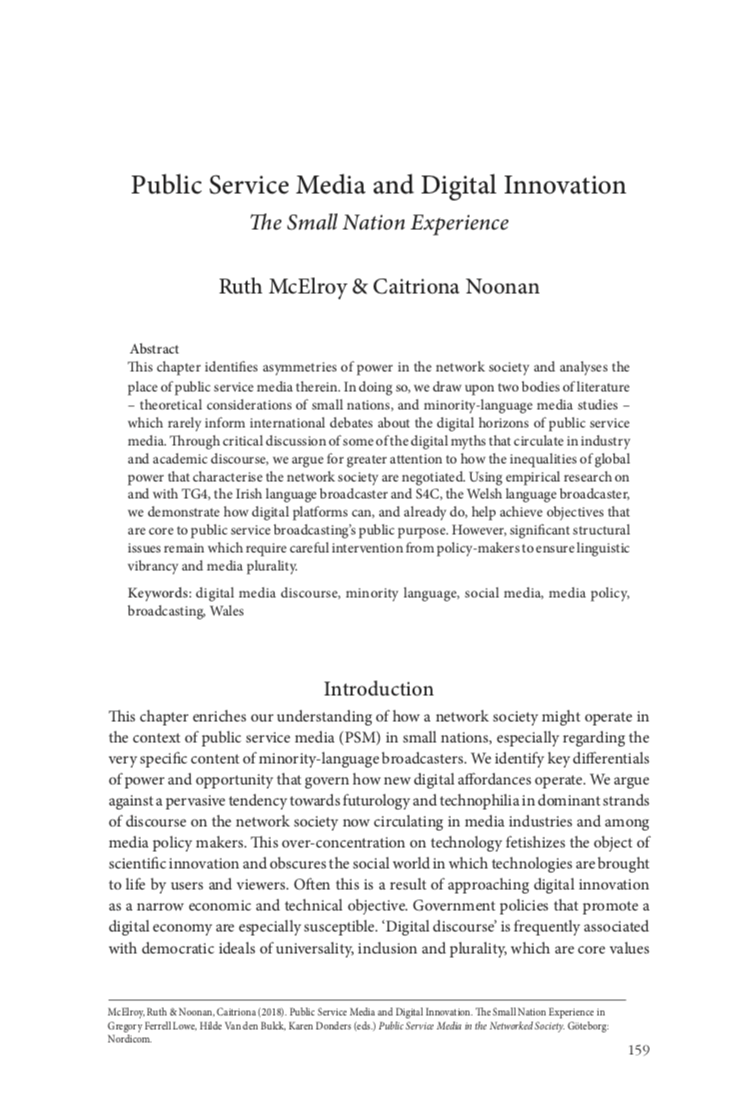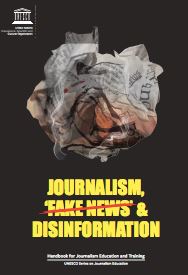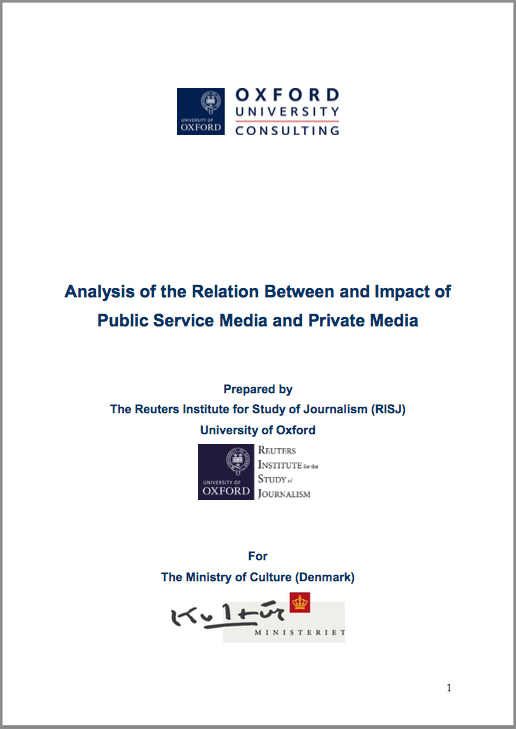News media broadly trusted, views of UK government response to COVID-19 highly polarised
News media broadly trusted, views of UK government response to COVID-19 highly polarised
REPORT
This Reuters Institute factsheet is the first of the UK COVID-19 news and information project and explores how people navigate news and information in the UK during the COVID-19 pandemic.
“In this RISJ Factsheet we examine people’s attitudes towards how news organisations, government and other institutions are responding to the coronavirus pandemic in the UK based on a survey fielded from 10 April to 14 April.” – Reuters Institute for the Study of Journalism
Trust in Media
REPORT
Trust in Media
Public Service Media are the most trusted source for news in 61% of European countries according to this EBU report.
European Broadcasting Union
“This report brings you insights on how people are turning to public service media news content as an essential trusted source at a time of crisis such as COVID-19.”
The new 2020 Trust in Media report includes an infographic and the dataset. Open access, login required.
Old, Educated, and Politically Diverse
REPORT
Old, Educated, and Politically Diverse
The Audience of Public Service News
Anne Schulz, David A. L. Levy, and Rasmus Kleis Nielsen – Reuters Institute for the Study of Journalism
Abstract
Public service media are often widely used, highly trusted, and do not face the business pressures with which their private peers have to contend. But a closer look suggests that the challenges that face public service media news provision are bigger – much bigger – than is commonly acknowledged, even in countries with a long history of strong public service media. This report analyses survey data from a sample of eight countries to assess the reach of public service news. It finds that the audience for public service news is old, educated, and politically diverse, and that public service media in many countries fall far short of the ambition to provide a near-universal news service, especially online. While they are among the most widely trusted news sources, they are often less trusted by people on the political right and people with populist attitudes.
Public Service Broadcasting in the Digital Age
JOURNAL
Public Service Broadcasting in the Digital Age
Journal of European Television History and Culture. Volume 8 – Issue 16 – 2019. Special Issue
Jérôme Bourdon, Mette Charis Buchman and Peter B. Kaufman (eds.)
Abstract:
This special issue proposes a reexamination of public service broadcasting (PSB) in the light of the most recent technological, political and economic developments. Traditional public service broadcasters, ideally designed to serve citizens rather than consumers to inform the national conversations in well-informed democracies, face the double challenge of commercialization (since the 1980s) and digitization (since the 1990s). The question of their survival in this context has been posed again and again. The need for a redefinition seems inevitable.
Organisational Culture of Public Service Media
REPORT
Organisational Culture of Public Service Media
People, Values and Processes (2015–2019)
Michal Glowacki and Lizzie Jackson
Abstract
In 2015-2019 Dr Michał Głowacki and Professor Lizzie Jackson investigated the internal organisational cultures of ten successful high technology clusters in North America and Europe to identify strategies to support the evolution of Public Service Media worldwide. Four media clusters were located in North America: Austin (Texas), Boston/Cambridge (Massachusetts), Detroit (Michigan) and Toronto (Canada). European clusters included London (UK), Warsaw (Poland), Copenhagen (Denmark), Brussels (Belgium), Tallinn (Estonia), and Vienna (Austria). To answer the question ‘what people, values and processes’ should Public Service Media embody going forward we found there is an urgent need for adaptation. Without internal change there is likely to be a decline in the ability of PSM to survive within the fast-evolving contemporary media and communications production and distribution landscape.
Public service broadcasting: as vital as ever
REPORT
Public service broadcasting: as vital as ever
By The UK House of Lords Select Committee on Communications

The House of Lords report on public service broadcasting in the age of video on demand concludes that PSBs are vital and in need of better support to produce high quality content and programming. But they also need to adapt to the changing media landscape in order to better serve audiences.
The report also reveals that public service broadcasting remains prominent within the UK and is a driver of the creative economy. Recommendations include the establishment of a new body called the BBC Funding Commission and to ensure that deals and plans are conducted with more transparency.
Read the PMA response to this report here.
Public Service Media & Digital Innovation: The Small Nation Experience
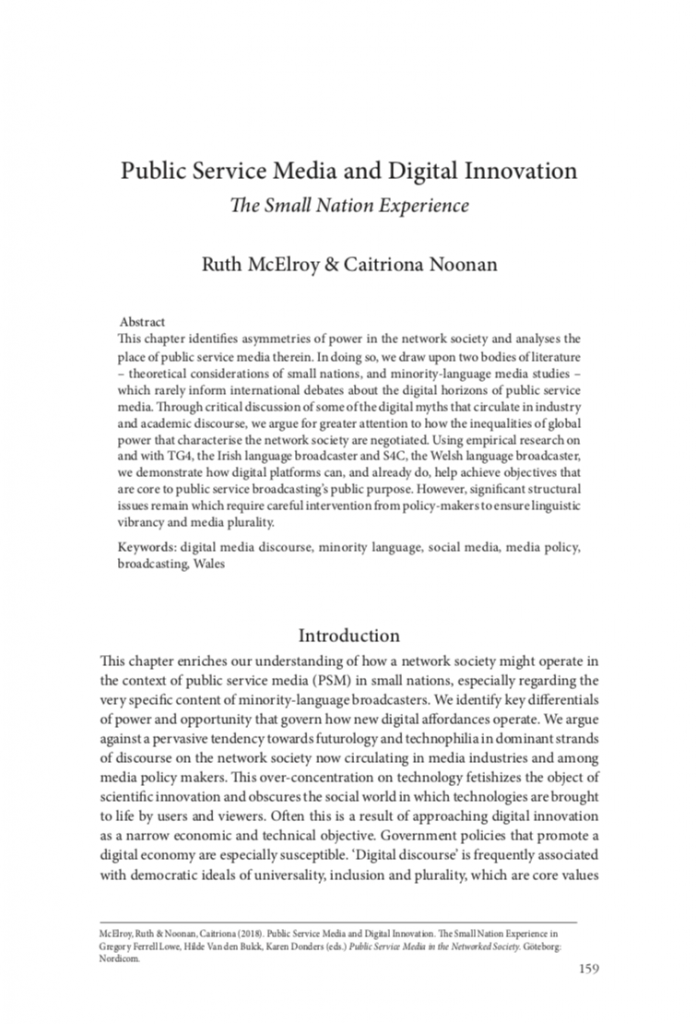
JOURNAL
Public Service Media & Digital Innovation: The Small Nation Experience
Ruth McElroy & Caitriona Noonan
This chapter from Nordicom’s 2018 publication Public Service Media in the Networked Society, emphasises the role of public media in providing minority language services in small nation states.
This excellent paper explores the way Irish Language Broadcaster,TG4, and Welsh language broadcaster, S4C, use digital platforms to achieve objectives that are core to their public service mandate, while negotiating the “asymmetry of power in the network society”. They note that significant structural issues remain, which require the intervention of policy-makers to ensure “linguistic vibrancy and media plurality”.
Journalism, 'Fake News' and Disinformation: A Handbook for Journalism Education and Training
REPORT
Journalism, ‘Fake News’ and Disinformation: A Handbook for Journalism Education and Training (UNESCO)
This recent publication explores the key feature of journalism and seeks to guide readers on how to best navigate the news environment and fight against misinformation.
As journalism is constantly transformed and challenged by a wide range of factors, such as technology, politics and users interaction with the media, understanding how journalism works it’s becoming essential.
Written by experts from all around the world and published by UNESCO, this handbook includes modules on trust, critical thinking and social platforms, media literacy, fact checking and combating online abuse.
Given its structure, this handbook is particularly useful for journalism educators as well as media professionals and editors and all those interested in how information is shared and used.
A Future for Public Service Television
Book
A Future for Public Service Television
Edited by Des Freedman and Vana Galdot
Television is on the verge of both decline and rebirth. Vast technological change has brought about financial uncertainty as well as new creative possibilities for producers, distributors and viewers. This volume examines not only the unexpected resilience of TV as cultural pastime and aesthetic practice but also the prospects for public service television in a digital, multichannel ecology.
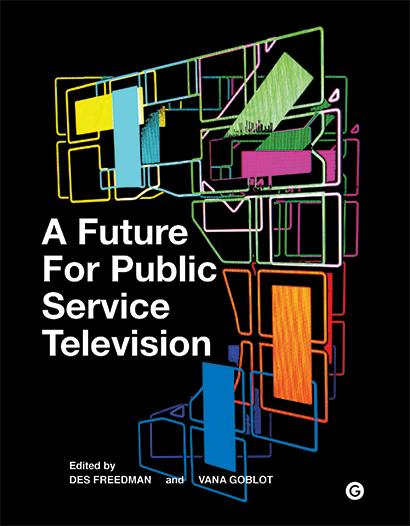 The proliferation of platforms from Amazon and Netflix to YouTube and the vlogosphere means intense competition for audiences traditionally dominated by legacy broadcasters. Public service broadcasters – whether the BBC, the German ARD, or the Canadian Broadcasting Corporation – are particularly vulnerable to this volatility. Born in the more stable political and cultural conditions of the twentieth century, they face a range of pressures on their revenue, their remits and indeed their very futures. This book reflects on the issues raised in Lord Puttnam’s 2016 Public Service TV Inquiry Report, with contributions from leading broadcasters, academics and regulators. With resonance for students, professionals and consumers with a stake in British media, it serves both as historical record and as a look at the future of television in an on-demand age.
The proliferation of platforms from Amazon and Netflix to YouTube and the vlogosphere means intense competition for audiences traditionally dominated by legacy broadcasters. Public service broadcasters – whether the BBC, the German ARD, or the Canadian Broadcasting Corporation – are particularly vulnerable to this volatility. Born in the more stable political and cultural conditions of the twentieth century, they face a range of pressures on their revenue, their remits and indeed their very futures. This book reflects on the issues raised in Lord Puttnam’s 2016 Public Service TV Inquiry Report, with contributions from leading broadcasters, academics and regulators. With resonance for students, professionals and consumers with a stake in British media, it serves both as historical record and as a look at the future of television in an on-demand age.
Contributors include
Tess Alps, Patrick Barwise, James Bennett, Georgina Born, Natasha Cox, Gunn Enli, Des Freedman, Vana Goblot, David Hendy, Jennifer Holt, Amanda D. Lotz, Sarita Malik, Matthew Powers, Lord Puttnam, Trine Syvertsen, Jon Thoday, Mark Thompson
About the Editors
Des Freedman is Professor of Media and Communications at Goldsmiths, University of London. He is project lead for the Inquiry into the Future of Public Service Television.
Vana Goblot teaches media and communications at Goldsmiths, University of London and is a research associate on the Inquiry. Her PhD examined questions of quality, cultural value and archival processes in relation to BBC4.
What we do and do not know about the impact of public service media
REPORT
What do we know about the relationship between public media and private media and their respective impacts?
The Reuters Institute for the Study of Journalism (RISJ) has published a new report commissioned by the Danish Ministry of Culture.
The report reviewed the status of public service media and private media by examining over a thousand academic and stakeholders studies. The research covered three main aspects: their political impact, social impact, and market impact.
The research indicates that there is strong evidence that public service media have a positive political impact. However, there is little research on the social and market impacts.
As RISJ says, “what we do not know about the impact of public service media, especially in a digital environment, is at least as striking as what we do know.”
